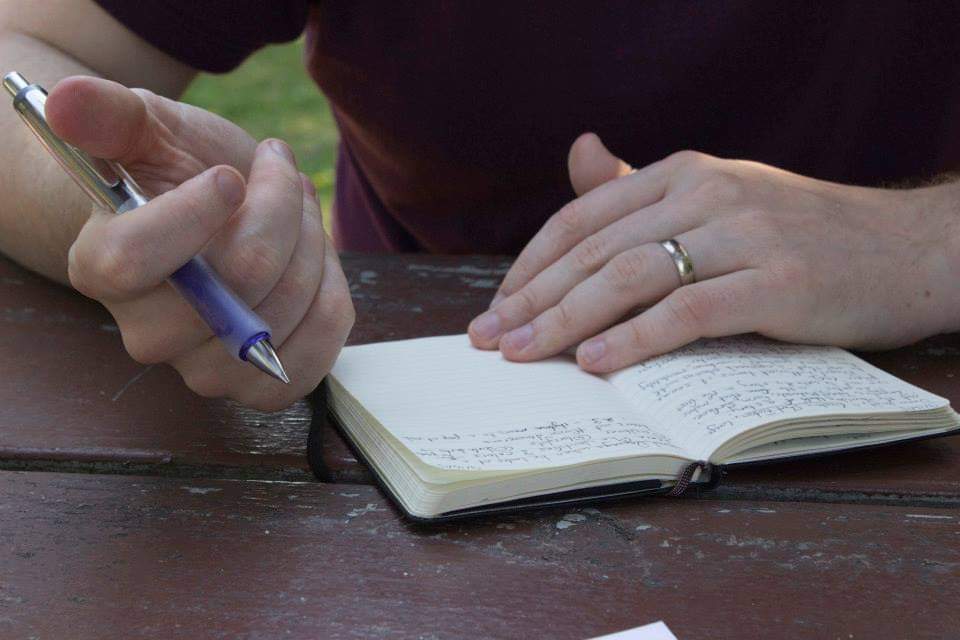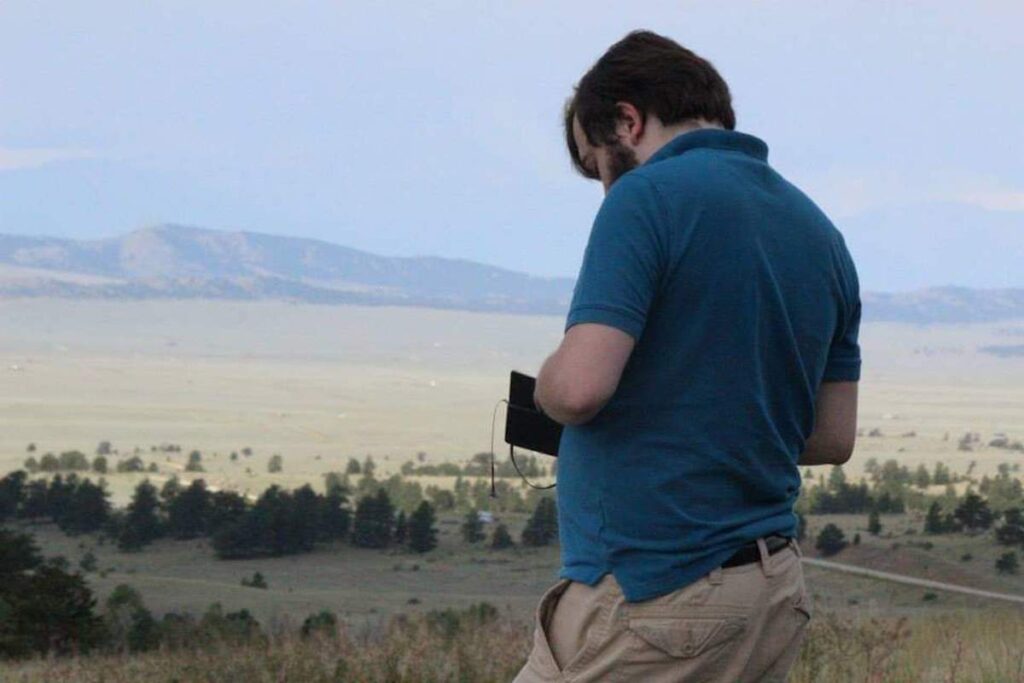The condition of mankind is, and always has been, so miserable and depraved that, if anyone were to say to the poet: “For God’s sake stop singing and do something useful like putting on the kettle or fetching bandages,” what just reason could he give for refusing? But nobody says this.
W.H. Auden, The Dyer’s Hand
There is a sentiment that you encounter from time to time that the writing of fiction isn’t really significant. It’s little better than a distraction, an indulgent hobby.
In addition to this unfortunate devaluation, you’ll also hear from a certain kind of expert that fantasy and its imaginative cousins have the dubious distinction of not being real literature anyway.
So, if you happen to be one of those that somehow holds both of those opinions, then you might sadly believe that fantasy is an insignificant non-art. Indeed, it might even be morally irresponsible to write it. Go do something useful.
I disagree.

Mounting a Defense for Frivolity and Significance
Now, some might respond, “Well, reading fiction is still, at the minimum, entertaining, and we need entertainment, so there’s nothing wrong with being a writer.” (Just as there’s nothing wrong with reading a book for “frivolous” reasons – Here’s a brief review of a very good book on reading for whim and pleasure…)
And there’s nothing wrong with that argument. Except that it undervalues the potential treasures and consolations of literature. (I suppose that would be something “wrong” with the argument – wouldn’t it?)
Here’s a counter position:
The first reading of some literary work is often, to the literary, an experience so momentous that only experiences of love, religion, or bereavement can furnish a standard of comparison. Their whole consciousness is changed.
C.S. Lewis, An Experiment in Criticism
In case you were wondering, I agree with Lewis. A literary work can change the whole consciousness of a thoughtful reader (not just a consumer of books, Lewis adds later). A literary work can be as momentous as love, religion, or the grief of loss.
That makes literature not just a significant contribution to human experience, but one of the most important.
That doesn’t mean we can’t have frivolous literature whose main value is its ability to make us smile, laugh, and even fall out of our chair. (Go read some P.G. Wodehouse.)
What it does mean is that there remains the potential in the art to really create something profound.
But can that something be fantasy?
But What About Fantasy?
Is the Odyssey a significant work? Perhaps The Aeneid? Ovid’s Metamorphoses (or Kafka’s Metamorphosis while we’re at it)? The Arabian Nights? What about The Divine Comedy? Orlando Furioso ? Gargantua and Pantagruel? Or The Tempest, Macbeth, and Hamlet? (Wizards, witches, and ghosts, oh my.) The Faerie Queene? Paradise Lost? The Journey to the West? Did I mention anything or anyone significant?
Dante and Shakespeare divide the world between them. There is no third.
T.S. Eliot
I would take many of the dismissers of the fantastic more seriously, if they were consistent in their disdain.
“No, no!” comes the protest, “That’s a misrepresentation, you’re turning us into straw men! Keep your grubby, appropriating paws off the classics! It’s that we don’t approve of such drivel as what J.R.R. Tolkien, Stephen King, or J.K. Rowling write.”
But why? Because it’s all make believe? Because it’s not old enough and hasn’t had time to prove itself? Because it’s not very well written? (You know, I have yet to hear a convincing answer.)
Now, the poet-scholar W.H. Auden had plenty to say about critics, but one line in particular I think is of value to consider here:
The one thing I most emphatically do not ask of a critic is that he tell me what I ought to approve of or condemn.
W.H. Auden, The Dyer’s Hand
That sounds like wonderful advice. I won’t always remember to live by it, but it’s still very sound advice. By the way, Auden rather enjoyed The Lord of the Rings, but he had this to say about it:
This is a work that will either totally enthrall you or leave you stone cold, and, whichever your response, nothing and nobody will ever change it. As a member of the enchanted party, I have found by experience that it is quite useless to argue with the unconverted.
W.H. Auden
Who would have thought it? Great scholars can completely disagree.
Now, to be fair, Harold Bloom, the late, great Yale literary scholar – who had little use for J.R.R. Tolkien, Stephen King, or J.K. Rowling – wasn’t against modern fantasy or science fiction entirely. For example, he includes John Crowley’s Little, Big in his The Western Canon. (See a compilation of Bloom’s canonical list.)

If there is great, classic literature that can be described in terms of the fantastic, then it seems obvious to assume that writing fantasy literature today can still be a worthy pursuit – whatever its specific merits. (For those interested in the specific merits of fantasy and fairy tale, I recommend Tolkien’s 60-something page essay “On Fairy Stories,” which can be found in various collections, including its own standalone volume.)
Let us shift the mode of our discussion further into the biographical.
A Storyteller of the Imagination
The first question to ask is what is the interest, the central kind of excitement inducing an author to write a work, as opposed to the wayside stimuli that may have amused him along the way
W.H. Auden, Lectures on Shakespeare
I have written elsewhere about certain select formative experiences that have shaped me as an author, as well as the influence of Dungeons & Dragons on my storytelling.
The first sparks of my imaginative fire were probably struck by fantasy’s power of enchantment (an echo of Auden’s response here) and its aesthetic. The latter is straightforward enough: Dragons, knights, castles, wizards, elves, grand battles, sweeping vistas, desolate wastes, Dark Lords and their terrible servants, and the desperate heroic struggle against impossible odds.
So yeah, I like the images that the words conjure and I’ve liked them for a long time. When other kids wanted to play with cars, I wanted to play with LEGO knights and dragons.
And like Bradbury, if you tried to separate me from my joys with teasing or mockery, you failed.
I have never listened to anyone who criticized my taste in space travel, sideshows, or gorillas. When this occurs, I pack up my dinosaurs and leave the room.
Ray Bradbury
But enchantment is a deeper thing than fascination.
My dad read me The Lord of the Rings when I was a child. I did not read it again until I was in my twenties, around 15 years ago (but I watched those cartoon movies till the video tapes fell to pieces).
Today, I’m on my twelfth time through (audiobooks for long trips – that’s how I roll in the Shire). And I have a Tolkien collection. And a Gene Wolfe collection, a George R.R. Martin collection, Michael Moorcock, Glen Cook (fantasy, sci-fi, and I’m working on those ‘detective’ stories)…I have a bunch of collections. (Talking about books can be like talking about food, you get hungry…)
What is it about fantasy…no, what is it about epic fantasy? Because I’m down for reading “Queen of the Black Coast,” “Beyond the Black River,” or “Red Nails” by Robert E. Howard, since they’re good stories. But I’ll go back to those individual stories more often because they are glimpses into the epic life of Conan – barbarian, mercenary, thief, reaver, slayer, king.
The Grand Story
The prime motive was the desire of a tale-teller to try his hand at a really long story that would hold the attention of readers, amuse them, delight them, and at times maybe excite them or deeply move them.
J.R.R. Tolkien, from the Forward to the Second Edition of The Lord of the Rings
Tollers is getting at it there for me. Yes, a really long story is what I’m after. But why? Because in a very long story you can really go for it.
A novel is an adaptive and resourceful creature. Indeed, it is The Apex Predator of the Literary World.
The novel can summon all manners of servants to its cause. Yes, prose, always prose, but also epistle, verse, song, quotations, epigraphs, footnotes, equations, plays; every literary form and technique can be made to serve the Novel’s Dread Power. It will take each of these individual arts and absorb them into its malleable frame, deploying them in service to its singular vision.
And the Epic is the Supremacy of Novels (the King of the Monsters one could say).

Book upon book, immeasurably strong, gathering and sustaining a symphony of creativity. Yes, it can be a boring and repetitive, yes it can be all the same song over and over and over. But, it can also be wide and deep and mysterious and true.
A short story gives you a peek. A novel lets you stay for a while. Epics are a commitment.
That’s the enchantment for me.
We go to Middle Earth, Earthsea, Urth and the Whorl and Blue and Green, Westeros, The Land, “Wu”, the Multiverse, Hyboria, Midkemia and Kelewan (that’s right, I invoked The Feist – but also Janny Wurts, ah ha!), and wherever the Black Company happens to be sojourning now.
And we go to stay a while.
But not alone.
A Long Journey with Dear Friends
Hamlet and Lear cannot be cabined, cribbed, confined by Shakespeare’s text. They break the vessels that he prepared for them.
Harold Bloom, The Anatomy of Influence: Literature as a Way of Life
Great characters achieve to a life beyond the printed page. They live on in the words of the readers who love (or hate them). Hamlet, Lear, Iago, Falstaff, Cleopatra, Richard III, Macbeth and his wife – there’s not much to them in terms of Shakespearean ink spent, but they are immense in substance.
We talk about the great characters in ways that you begin to wonder if they’re actually real and not merely shadowy illusions. We come to love them, to hope for them (even when their entire fate is settled in indelible ink). We treasure up the wisdom that falls from their moves and quote them to settle disputes (heated and otherwise).
But you don’t have to be The Bard to provoke such a response. Luke, Leia, Han Solo, Obi-Wan, Yoda, Darth Vader, Palpatine – even Boba Fett. Star Wars fans wanted more. More than the Original Trilogy gave us. They dreamed more, wrote more, drew more, acted more, programmed more.

We collected and created and went to conventions. We took our love and treasured it up and shared it with our children, careful not to spoil that big reveal.
Today, we’ll even take more, even when it isn’t that good. We’ll make excuses for the badness, just to have more.
Because we want more time with dear friends in their perilous realm. And there are those of us who still hope that the magic will return in its fullness, one day. Why? Because the Star Wars universe broke the three movie vessel that Lucas originally prepared for it.
That’s what I want out of writing an epic. I want to meet my characters, listen to them, and walk with them down the long, long road of their story. I want them to have time.
And I want you, dear reader, to have time with them. Yes, I want my characters to break the confines of the page and become something more because they are known and loved by you.
A Many-Voiced Symphony…
And part of loving my characters is that I strive to be a polyphonic author.
There are books where all the characters are merely puppets for the author’s ideology. Theses books are essentially monologues, with the author-ventriloquist thinly disguising their voice behind cheap masks and parlor tricks.
And this is distasteful to me.
George R.R. Martin has shown consistent skill in allowing his point of view characters to speak out of themselves. (But we have yet to see how his narrative will resolve, so I will hold off making any definitive judgments even with the HBO series to reference).
Yet, the true master (and father) of the art of polyphony is Dostoevsky, especially in The Brothers Karamazov. The author warns us in the forward:
Starting out on the biography of my hero, Alexei Fyodorovich Karamazov, I find myself in some perplexity. Namely, that while I do call Alexei Fyodorovich my hero, still, I myself know that he is by no means a great man.
So, thanks to this authorial intrusion, we are to understand that Aloysha (Alexei Fyodorovich) is the hero of the narrative, but also that there is a strangeness to him in the narrative space. And this is played out in the novel (it’s an epic, actually).
Because the story really is about the brothers.
Yes, the pious Aloysha is the “hero,” but we also walk with the fleshy Dmitri, the brilliant atheist Ivan, even the (probably) half-brother Smerdyakov. We are moved to sympathy for each of them (well…it’s hard to have sympathy for Smerdy as the story unfolds – but let us not forget that Raskolnikov from Crime and Punishment seemed beyond redemption, too…).
Dostoevsky is not such a small author that he needs his hero’s worldview to prevail at every turn. Ivan’s “The Grand Inquisitor” is not rebuffed with a devastating exercise in rhetorical apologetics.
The words are allowed to stand as witness in the text, voice unhindered. Ivan is allowed to speak from himself. Dimitri is allowed to be who he is.
(For more on polyphony and related terms, see the formidable thinker, Mikhail Bakhtin: his own writings here and here, and this magisterial academic survey. Or my own essay, “How to Create Characters That Are More Than Puppets.”)
So let all the birds sing…
…In a Wide Range of Registers
Epics can sustain many voices, and that is a matter of width and breadth.
They can also sustain a wide range of registers, and this is a matter of height and depth. Let me explain with some gestural showing.
In my experience, the master of registers in epic fantasy is Tolkien. Consider:
- The festiveness of Bilbo’s party
- The frivolousness of the bath song
- The nonsensicalness of the troll song and much of Bombadil’s singing
- The pastoralness of all that walking
- The suspensefulness of the flight from the Nine
- The tragically heroic “Lament for Boromir”
- The boldly heroic “Forth the Three Hunters”
- The mysteriously magical Old Forest, Fangorn, and the Golden Wood (three very different forests)
- The horror of Shelob’s cave
- The mythically rich charge of Théoden King, “like a God of old, even as Oromë the Great in the battle of the Valar when the world was young.”
- The romantic uncertainty between Faramir and Éowyn
- The heady celebratory tones of victory
- The sad-sweet farewell at the Grey Havens

Moving into the contemporary period, George R.R. Martin’s storytelling is of a grimmer tonality than Tolkien’s, but he also establishes and sustains a wide range of registers. In his case, he is able to do so through his use of 3rd person subjective point of view. We receive the story from the perspective of some couple dozen characters – young children to older adults, over a period of years.
(In comparison to Martin, Erikson’s Malazan Book of the Fallen has hundreds of points of view spread out over 10 books from a variety of cultural perspectives. The Crippled God alone, book 10, has 141 point of view characters ). This degree of fragmentation is intriguing and certainly helps generate an aura of epicness, but I cannot comment on it in greater depth as I’ve only read through the series once at the time of this writing, and not critically.)
A chorus of voices allowed to sing with a wide range of expression makes for a richer narrative.
An Art Worthy of the Devotion of Patient Pursuit
And so, in this little essay, we have come down the road of self-reflection together.
Let it here be established that literature, and fantasy literature in particular, can be worthy, being concerned with either frivolous or weighty matters.
Also, it is here stated, that I write, trusting in the grand opportunity of the literary form of epic, walking with many dear friends whom I provide room to speak on many things, from the low to the high, the simple to the mythic.
It is an old love, long-nurtured and reflected upon.
And the fruits of its craft are wonderful words for others to read – that we may all share in the wonders of the fantastic imagination.
Want more words? See the horse below about a newsletter. Or scroll on down to make a comment.

